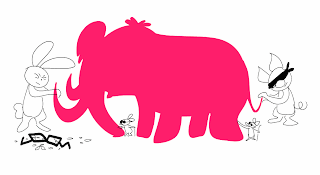MY IDEAL STORY THEORY
1. It should be easy to apply.
2. It should be easy to remember.
3. It should be inspiring and insightful.
4. It should be prescriptive, not only post analytical.
5. It should help you find problems with your story.
6. It should help you find solutions to problems in your story.
7. Like a map it you should be able to see where you are.
8. It should make the story structure visible while working on it but invisible to the viewer.
9. It should allow for structural variations in different types of films.
10.
11. It should make you want to write.
12. It should have psychological depth.
Sound impossible? Yes, but aren't stories about overcoming impossible odds. If it exists why hasn't someone seen it before? I believe that the answer to this question is that some have seen pieces of it.
Remember the story of the six deaf elephants? It's a story that started in India. Or was that six blind mice? In my version it was two blind mice, a pig with a blindfold and a Scared Bunny without his glasses. Each one encountered an elephant and felt it. One felt a tusk, another felt a leg, another a tail and another a trunk. They all got together and couldn't agree on what they encountered.
Now imagine these same mice were walking along in a well worn rut dating back to 300 B.C. They wouldn't have encountered the elephant at all.
So everyone went along following the rut never looking outside of it and they never found an elephant.
"Denying something you cannot perceive ends up becoming an argument for your limitations." Wikipedia on the Blind Men and the Elephant
1. Who says it needs to be hard? The writing itself is hard work. But just because something is easy doesn't make it less valuable, does it? According to the great Wikipedia, Occam's razor is a scientific principle that states among competing hypotheses, the one that makes the fewest assumptions should be selected.
This method is extremely easy to apply. I've written four children's picture books with outlines for a dozen more and one psychological thriller screenplay (my first) using this approach all in 4 months. (The research for the screenplay took a lot longer.)
The feedback from those who have seen my presentations on it usually have an aha! moment.
2. I should be easy to remember. Once you see it you'll never forget it and once you see it, since the pieces are all logically connected you'll remember all the pieces in order. Can you name the stages of Campbell's Hero's Journey in order?
3. Inspiring and insightful. I have been on a creative roll since I discovered this and I'm continuing to learn new insights about storytelling from it.
4. The hero's journey, plot points and Aristotle's drama curve all can be used to analyze movies that have already been made. They are not as useful when trying to create a new story, in my opinion. I want a theory that will guide me without limiting my creativity.
5. & 6. It should help you find problems in your story and help you find solutions. I was working on a feature at a studio that had story problems. One morning I awoke and there it was fully formed how to solve the problems.
7. It is exactly like a map that shows you where you are.
8. It is visible to you when you see it but invisible to your audience, unless they're looking for it. It's like those magic eye pictures. It looks like one thing but put on the special glasses or squint your eyes just right a new image emerges.
9. It should allow for structural variations. I have found 5 types of structure variations, all with logical reason for the variation. There may be more that I haven't discovered yet. It even applies to games. They're still easy to remember. And when you don't have a clear structure it shows.
I will present many examples of films with post analysis along with stories that I've created using it prescriptively. If you create some using it, I'd love to hear about them and maybe include them in the book properly credited, of course.
10. It should cover every story ever told. Why? Just because Joseph Campbell said there is only one story? I don't want to tell every story, I just want to not get lost trying to tell my story. I don't want a cookie cutter, I want singularity.
11. It should make you want to write. Maybe this is asking too much, however if writing becomes less frustrating because of it, maybe you will want to write more.
12. It should have psychological depth. This will probably be a chapter to itself so I'm going to save this for the next storyteller's log...



No comments:
Post a Comment